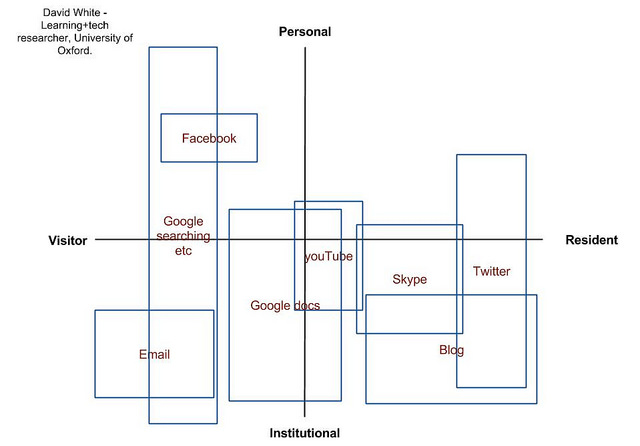As we live in the world where technologies are constantly improving and change is fast, we can’t help but to keep ourselves constantly updated with the latest news, technologies, etc. We could get all the relevant information that we need at a click of our fingers on our mobile devices. However, this digital world that we live in, have differentiates us into two different categories. They are namely the visitors and the residents.
In my opinion, visitors are mainly people who use the Web as a tool to retrieve certain information that they need for a certain desired outcome (1). For instance, if someone wants to know the latest Apple gadget, they can do a quick search on the Internet and get the answers immediately. They will only be online for a while as they do not see the need of staying there for long. They may build their Facebook account to be something comprehensive but they will probably not be on LinkedIn and all the other profiling networks. In short, visitors will be the ones who will separate their online existence from their social life.
Residents are basically people who combine their online existence with their life. They are closely aligned with the social networks and the happenings within the digital world. They are the ones who will be deeply involved on their networks as it is their way of living (2). In fact, they are totally fine with the concept of having part of their life live on the digital world itself. It is their comfort zone.
In case you are unable to visualise the clear differences between visitors and residents. Have a look at the model that Khairul, my classmate has shared with us from David White.
Figure (4)
As for me, initially I would say I’m more of a visitor as compared to a resident. I’m not someone who put in much effort in building my social networks, much less my online profile. I could be using the Internet for more than 5 hours daily but that serves as a tool to meet my needs (3). However, after looking at David White’s model, I’m starting to see myself becoming more of a resident. Why? It is simply because I’m beginning to be more engaged in Twitter and Blogging as I live on this digital space.
What about you? A Visitor or a Resident? Share your thoughts, long to hear from you 🙂
References
- Visitors and Residents: A new typology for online engagement | White | First Monday. 2014.Visitors and Residents: A new typology for online engagement | White | First Monday. [ONLINE] Available at:http://firstmonday.org/article/view/3171/3049%20https://comminfo.rutgers.edu/~tefko/Courses/Zadar/Readings/Selwyn%20dig%20natives,%20Aslib%20Proceedings%202009.pdf. [Accessed 27 November 2014].
- TALL blog » Blog Archive » Not ‘Natives’ & ‘Immigrants’ but ‘Visitors’ & ‘Residents’. 2014.TALL blog » Blog Archive » Not ‘Natives’ & ‘Immigrants’ but ‘Visitors’ & ‘Residents’. [ONLINE] Available at:http://tallblog.conted.ox.ac.uk/index.php/2008/07/23/not-natives-immigrants-but-visitors-residents/. [Accessed 27 November 2014].
- Evaluating digital services: a Visitors and Residents approach – Jisc infoNet. 2014. Evaluating digital services: a Visitors and Residents approach – Jisc infoNet. [ONLINE] Available at:http://www.jiscinfonet.ac.uk/infokits/evaluating-services/. [Accessed 27 November 2014].
- Visitors and Residents map 1 | Flickr – Photo Sharing!. 2014.Visitors and Residents map 1 | Flickr – Photo Sharing!. [ONLINE] Available at:https://www.flickr.com/photos/jiscinfonet/12947691804/in/set-72157641903755433/. [Accessed 27 November 2014].


Ever think of how topic 1 could be linked to a real-life context? Hello! I have read your interesting blog and came up with some comments which is about the further expansion your posting. 😀 Here it goes!
As technologies are constantly improving and time waits for no man, what impact do you think will have on employees that work for companies that embrace new soft wares packages like Work.com (Reference 1)?
For younger generation employees (those below 30 years old), we can’t deny the fact that they are mostly “Residents”. Hence, they would not find it a problem as they are the ones that grew up together with technology like smart phones, tablets or PCs etc. However, these new soft wares stand to pose as a threat to those that are of older generations who lack digital skills.
How would you, in the viewpoint of those companies that are aligning with the latest technology, strike a balance between all employees who come from different IT backgrounds? How would you convince those of the older generations’ employees with your own personal experiences to get more engaged in the digital space?
References
Reference 1:
Five ways talent management must change – Forum:Blog Forum:Blog | The World Economic Forum. 2014. Five ways talent management must change – Forum:Blog Forum:Blog | The World Economic Forum. [ONLINE] Available at: http://forumblog.org/2014/10/don-tapscott-talent-management-millennials/. [Accessed 27 November 2014].
LikeLike
Hello Xiu Zhen! Thanks for reading my post. In response to your first question, I think employees will be trained in the area of digital literacy as they are required to write blogpost, learning how to gather data and defend themselves, building up on their social aspects. This will allow the companies to further improve in their communication towards their employees in the long-run.
As for your second question, I will say different companies use different approaches. My suggestion is that for the employees to set aside time and space to learn and help one another to get in touch with the digital space. For instance, the managers can deliver the meeting through a Google Hangout video chat given that they are overseas at the moment, etc. Younger employees will cease to assist the older generation’s employees. In fact, encouraging them to blog up their findings could be a way to make them learn.
LikeLiked by 1 person